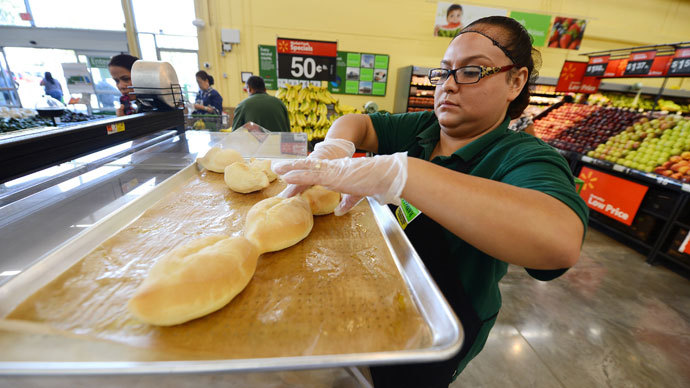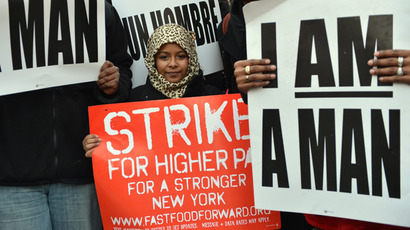California set for historic minimum wage raise while DC rejects ‘living wage bill’

The California Senate approved raising the state’s minimum wage on Thursday to $10 an hour by 2016, one of the highest rates in the nation.
The state Senate passed AB10 by a party-line vote, 26-11,
approving a gradual minimum wage jump from $8 to $10 over two
years.
The bill now goes to the state Assembly for what will be an
almost assured passage, and then to Gov. Jerry Brown, who has
expressed support for the measure.
The raise would be California’s first in six years.
On the flip side, Washington, D.C. Mayor Vincent Gray vetoed a
“living wage” bill Thursday that would have mandated large
retailers like Wal-Mart pay workers a higher wage.
Gray said he rejected the city-council-approved bill because it
was “not a true living-wage bill,” and because its
benefits would be limited to “a small fraction of the
District’s workforce.”
Wal-Mart announced in 2010 its plans to build as many as six
stores in the District over the coming years. The plans were put
on hold with the advent of the bill, known as the Large Retailer
Accountability Act (LRAA), to force powerful companies moving
into the city to address their use of low-wage employment.
The legislation would require retailers with corporate sales of
$1bn or more and operating District stores of at least 75,000
square feet to pay their employees no less than $12.50 an hour in
combined wages and benefits. Workers who collectively bargain
with employers for wages would receive an exception in the bill.
Large retailers already in the District would have four years to
comply.
Gray cited retailer threats, including Wal-Mart, that if the LRAA
passed, they would not locate in the city.
“If I were to sign this bill into law, it would do nothing but
hinder our ability to create jobs, drive away retailers, and set
us back on the path to prosperity for all,” he said.
In announcing his veto in a letter to City Council Chairman Phil
Mendelson -- who shepherded the LRAA to passage -- Gray said he
would work with the Council to enact a minimum-wage increase from
all employers. In an interview, Gray wouldn’t specify what hike
he would advocate, only saying any increase would be
“reasonable.”
Washington State currently has the highest state minimum wage, at
$9.19. Some cities, such as San Francisco, have slightly higher
rates.
Connecticut, New York and Rhode Island have all approved rate
hikes starting in 2014, while 34 states and Puerto Rico are
considering introducing legislation for their own minimum wage
raises.
There are five bills in Congress regarding raising the current
federal minimum wage from $7.25.
Fast-food workers across the country have rallied and walked off the job in waves this summer
calling attention to their own low wages and stunted hours,
though their efforts have yet to cause any employers to budge.














